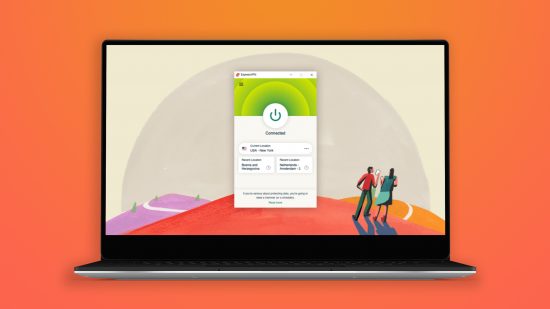Our Verdict
If you’re looking for a fire-and-forget VPN solution that can support travel, work and gaming whilst trusting in the strength of its security infrastructure, ExpressVPN is an excellent solution and probably the best on the market right now.
- Servers available in 94 countries
- IP addresses refreshed regularly
- Lightway protocol delivers speedy performance
- Pricier than other providers
- Fewer individual servers than other providers
As well as being an avid gamer, I’ve worked in IT and cybersecurity for over 7 years, in roles in tech support, security consulting, and ethical hacking. Online privacy and security aren’t just important to me, they’ve been the bulk of my career and I’ve seen the impacts of a lack of security first-hand. Lost data, stolen money, stolen identities – none of it is particularly fun.
Thankfully, there are some simple, common-sense tools available that can make it just that much harder for an attacker or thief to make you their next mark. An extremely effective line of defense that anyone can implement into their gaming workflow is a Virtual Private Network (VPN). ExpressVPN is one of the best gaming VPNs available today, and as well as protecting your data, it can give you access to regional-exclusive content in video games as well as streaming services when you’re on holiday.
If you want to find out more about how the best VPN services like ExpressVPN work first, read our what is a VPN guide. We’ve also put together an ExpressVPN FAQ. I’ve been testing ExpressVPN for a little over two weeks for this review, but I have also been a previous customer of theirs for quite some time before this. Below, we’ll help you to decide whether ExpressVPN is worth your money in 2023 (spoiler, yes it is).
Why you can trust our advice ✔ At PCGamesN, our experts spend hours testing hardware and reviewing games and VPNs. We share honest, unbiased opinions to help you buy the best. Find out how we test.
Specs
ExpressVPN specs:
| Server totals | 3,000+ servers in 94 countries |
| Compatible games | Fortnite, Call of Duty: Warzone, Dead by Daylight, FIFA, Minecraft, Apex Legends, GTA Online, PUBG, and more |
| Free trial | No free trial |
| Money-back guarantee | 30 days |
| Simultaneous connections | 5 |
| Router support | Yes |
Speed
If you’re a committed online gamer, then you already know that only two numbers really matter: frames per second and ping. A VPN can’t help you with the first one, sadly.
However, a VPN can help you secure your game connection and any payment information transferred during any in-game purchases without tanking your ping to the point where your gaming suffers.
For those unfamiliar, ping is a networking term that refers to the amount of time it takes for the data to complete a round trip from your device to the game server and back again. The faster the round trip takes, the quicker you’ll see your actions on your device reflected on the screen at the game server. Too slow, and you’ll start to see a noticeable gap between the two, called lag.
Before connecting to my Express VPN client, I went to Google and checked my raw WiFi connection speed with no VPN used, and got the following results:
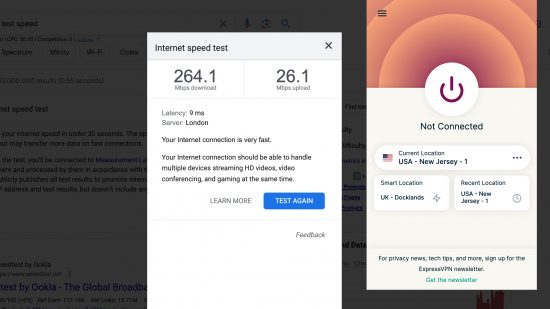
A speed that fast is great, but I’m not currently experiencing the security benefits that using a VPN brings. Let’s start up ExpressVPN’s client and choose a server location to go through. I’m currently situated in South Dakota in the USA and I’ll pick the United Kingdom because it’s where I’m from originally.
Now anything I connect to while using ExpressVPN will seemingly originate from their UK-based Docklands servers if someone was tracking IP geolocations at the game server end. Let’s see what using this VPN has done to my WiFi connection speed:
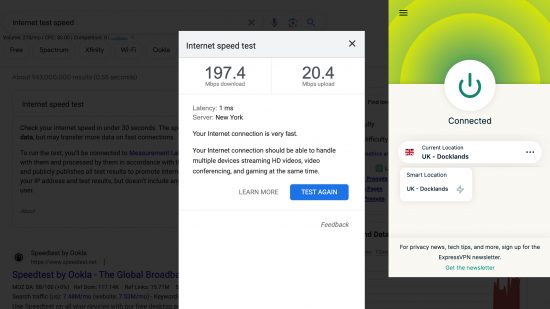
Hang on, that’s quite a bit lower – what gives? There’s actually a good explanation for this! Any of the best gaming VPNs (ExpressVPN included) functions by encrypting your data and then sending it through specific communication tunnels. This means that the system needs to encrypt, package up, route, transmit, and decrypt everything your device is sending out and receiving back. This unfortunately comes at a cost of network speed and is just a factor of how computer networking works.
However, note that my speed is still 197Mbps whilst connected to Express VPN! This is absolutely enough to load up and play online games securely with no discernible issues or lag whatsoever – see? Overall, ExpressVPN does a great job of preserving my gaming connection whilst giving me the peace of mind that my data is more secure than it otherwise would be without one.
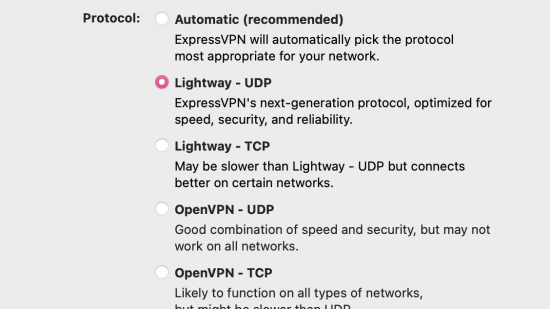
Security
One of the things I really enjoyed about ExpressVPN during my review was looking into some of the work they’ve done to ensure the security of your connection.
ExpressVPN has developed its own VPN communications protocol called Lightway which is already implemented into its VPN server network. Lightway offers a few specific, tangible improvements for anyone out there who is truly concerned with privacy and security:
If you’re building a VPN application, you historically had two main options for how to encrypt the data and process the transmissions – OpenVPN and WireGuard. WireGuard is faster and more modern, while OpenVPN is slower, but supports more ways to communicate and will run on damn near anything.
One issue with WireGuard though, was that the key used to scramble/unscramble data is mapped to a specific internal network address, which on a long enough timescale of watching and observing network activity, might allow you to pick up on a specific user’s activity even if you can’t read what the specific data.
WireGuard was also not built by hiding the fact your traffic is in a VPN (called obfuscation) in mind, which can make identifying and then blocking a WireGuard connection reasonably simple for someone who knows what they’re doing. This isn’t a failing of WireGuard, they’ve always been clear about this not being their focus, but it is something that’s worth bearing in mind.
Another issue is that WireGuard also only supports one method of transporting data, a protocol called UDP, while Lightway supports both UDP and another method of transporting data called TCP. From a networking perspective, UDP is really good for real-time uses like video conferencing and voice calling.
Most of the things you’ll want to do while at the airport or at the coffee shop – checking e-mail, downloading files, logging into corporate portals to get work done, etc. – require setting up a TCP connection, though. Lightway lets you secure the data you send using both communication methods.
Overall, I was impressed with Lightway and how they’ve engineered it to be the “best of both worlds” VPN protocol. If you still want to use OpenVPN because you trust it and you know what you’re doing, ExpressVPN lets you do that too.
Ease of use
In terms of ease of setup and ease of use, ExpressVPN gets high marks. Installation on the MacBook Pro M1 I used took around five minutes, with the installer running automatically once launched and the setup client appearing soon after. I also tested it on a Windows gaming laptop or gaming PC, and found the installation is just as straightforward.
Once my activation code had been entered, I was greeted with the following menu where I could choose my VPN server location. To get started, you simply click your location of choice, wait a few seconds, and then you’re connected. You can now browse, download, and game to your heart’s content and an average user shouldn’t need to change any of ExpressVPN’s default settings out of the box to get it working.
ExpressVPN can also be added as a Chrome extension so that you can easily connect and disconnect without having to leave your browser. Again, this was painless, and took a minute or so to get up and running.
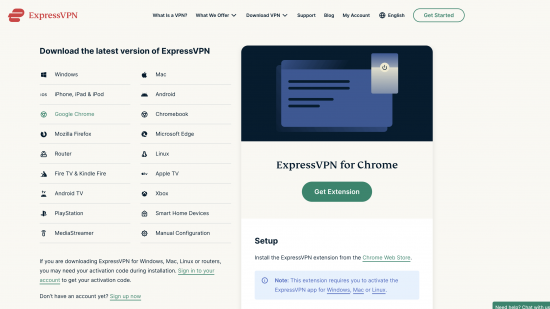
ExpressVPN verdict
Easy to set up and easy to use, ExpressVPN performs so well that you forget it’s even there – exactly what you’re after from a VPN. We’ve broken down the full score into sections so that you can get a better understanding of how ExpressVPN performs.
- Speed: A noticeable, understandable drop from encrypted speeds but still impressive and more than enough to game at full blast – 8/10
- Privacy: Lightway is a really interesting, open-source advancement in VPN protocols already in use across the ExpressVPN network, as well as using rock-solid encryption protocols. – 8/10
- Usability (app): The Windows and Mac apps (and the Chrome Extension) are extremely easy to setup and use, and have a very intuitive interface – 10/10
- Compatibility: ExpressVPN works seamlessly on Windows,
Mac, iPhone, iPad, and iPod (and Apple TV), Android (and Android TV), Google Chrome, Mozilla Firefox, Fire TV & Kindle Fire, Xbox, PlayStation, and smart home devices. In short, it works with almost every single smart device that connects to the internet – 10/10 - Cost: Express VPN starts at $12.95 monthly, and that includes a discount for paying yearly. There are regular deals, which take the price to as little as $5.67 (£5.56) per month. This is incredibly reasonable, considering the size of the engineering backend keeping it all running – 8/10
- Performance: Not a single facet of my work or leisure suffered while connected, though there were some brief periods where the connection dropped for seemingly no reason. Overall fantastic, though – 9/10
- Support: Not required during the review period, but have been a previous customer and ExpressVPN support was fantastic if a tiny bit slow to respond – 8/10
